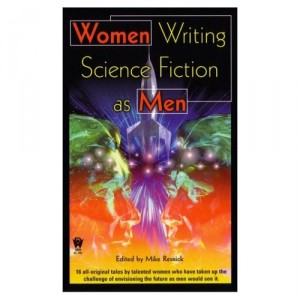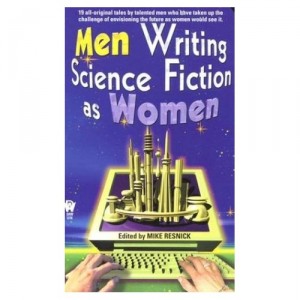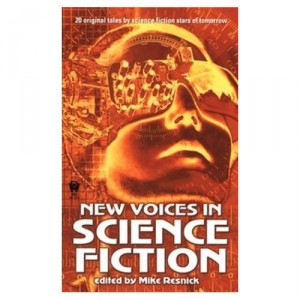Two of these anthologies explore two sides to the same coin. Science fiction has always been about exploring the realm of possibilities, and that includes exploring gender and perception. Editor Mike Resnick approached a number of writers, and asked them to imagine a world from the viewpoint of the opposite gender. The only rules: that the story had to be told from the viewpoint of a specific gender (male if the author was female, female if the author was male), and if changing the narrator from Victor to Victoria or vice versa didn’t invalidate the story, they didn’t want it. That said, the authors were all ready for the challenge.
 In the first volume, Women Writing Science Fiction As Men, authors such as Kristine Kathryn Rusch, Janis Ian, Laura Resnick, Severna Park, Terry McGarry, Jennifer Roberson, and Mercedes Lackey all turn in some truly thought-provoking stories. However, it’s Leah A. Zelde’s “Big” which gets my vote for the strangest, seeing as how it starts with e-mail spam for penis enlargement and take the idea to a ludicrously imaginative conclusion. Kristine Kathryn Rusch’s “Homecoming” looks at the idea of paternity suits and spaceflight relativity in a poignant, yet interesting manner. Severna Park’s story, “Call For Submissions,” actually draws upon the early history of the SF field itself for inspiration, telling the story of some of its earliest magazine editors. Unfortunately, this story seems to violate the one major guideline, in that the narrator is a female. I guess it’s okay to break the rules after all. In “What Goes Around,” Robyn Herrington looks at body-hopping and crimes and misdemeanors. Adrienne Gormley’s “Maxwell’s Law” is a clever tale of a theoretical idea in human form. “Diving After Reflected Woman,” by Terry McGarry, tells the story of a police video-recorder who takes a very unusual confession, and has a difficult choice to make in response. Mercedes Lackey contemplates alien television and the human condition in “Sweeps Week.” Jennifer Roberson’s “Jesus Freaks” looks at a future desperately in need of some divine reassurance. And Leslie What’s story, “All My Children,” examines the fate of a sperm donor with some real family issues.
In the first volume, Women Writing Science Fiction As Men, authors such as Kristine Kathryn Rusch, Janis Ian, Laura Resnick, Severna Park, Terry McGarry, Jennifer Roberson, and Mercedes Lackey all turn in some truly thought-provoking stories. However, it’s Leah A. Zelde’s “Big” which gets my vote for the strangest, seeing as how it starts with e-mail spam for penis enlargement and take the idea to a ludicrously imaginative conclusion. Kristine Kathryn Rusch’s “Homecoming” looks at the idea of paternity suits and spaceflight relativity in a poignant, yet interesting manner. Severna Park’s story, “Call For Submissions,” actually draws upon the early history of the SF field itself for inspiration, telling the story of some of its earliest magazine editors. Unfortunately, this story seems to violate the one major guideline, in that the narrator is a female. I guess it’s okay to break the rules after all. In “What Goes Around,” Robyn Herrington looks at body-hopping and crimes and misdemeanors. Adrienne Gormley’s “Maxwell’s Law” is a clever tale of a theoretical idea in human form. “Diving After Reflected Woman,” by Terry McGarry, tells the story of a police video-recorder who takes a very unusual confession, and has a difficult choice to make in response. Mercedes Lackey contemplates alien television and the human condition in “Sweeps Week.” Jennifer Roberson’s “Jesus Freaks” looks at a future desperately in need of some divine reassurance. And Leslie What’s story, “All My Children,” examines the fate of a sperm donor with some real family issues.
 In Men Writing Science Fiction As Women, the theme is turned around. Now it’s male authors trying to write from a female viewpoint. Tobias Buckell, Robert Sawyer, Michael Burstein, Barry Malzberg, Jack Dann, David Gerrold and others all take their turn at bat. Tom Gerencer’s “Not Quite Immaculate” details a somewhat tongue-in-cheek tale of a lesbian spaceship pilot entrusted with a very unusual cargo. In “Relativity,” Robert Sawyer examines what happens to a family dynamic when one member spends several years at light-speed, leaving the rest behind on Earth. John Teehan’s “A Small Goddess” is an unusual look at an AI with a female identity. Nick DiChario turns in “Zolo and the Jelly Ship,” a strange tale of a ship that chooses its own captain, and reshapes them as needed. In “Love Story,” Frank M. Robinson recounts a political marriage constructed to fail, then delivers a surprising twist at the very end.
In Men Writing Science Fiction As Women, the theme is turned around. Now it’s male authors trying to write from a female viewpoint. Tobias Buckell, Robert Sawyer, Michael Burstein, Barry Malzberg, Jack Dann, David Gerrold and others all take their turn at bat. Tom Gerencer’s “Not Quite Immaculate” details a somewhat tongue-in-cheek tale of a lesbian spaceship pilot entrusted with a very unusual cargo. In “Relativity,” Robert Sawyer examines what happens to a family dynamic when one member spends several years at light-speed, leaving the rest behind on Earth. John Teehan’s “A Small Goddess” is an unusual look at an AI with a female identity. Nick DiChario turns in “Zolo and the Jelly Ship,” a strange tale of a ship that chooses its own captain, and reshapes them as needed. In “Love Story,” Frank M. Robinson recounts a political marriage constructed to fail, then delivers a surprising twist at the very end.
Both of these anthologies are great fun, ranging from the serious to the humorous. For the most part, they hit their targets, with only a few wayward misses to mar the overall effect. Overall, I’m happy to recommend both collections, individually or as a set.
 On the heels of his other two anthologies, Mike Resnick also gives us New Voices in Science Fiction, which showcases twenty of the genre’s up and coming writers, some of whom have seen multiple novels published in recent years, some of whom are still working on their next short story publication. Some of them have been nominated for, or even won the Campbell Award for best new SF writer, while others have seen Hugo, Aurora, or Philip K. Dick award nominations. What they all have in common is that they’ve come to prominence in the past decade or so, and they all represent the next generation of great SF writers.
On the heels of his other two anthologies, Mike Resnick also gives us New Voices in Science Fiction, which showcases twenty of the genre’s up and coming writers, some of whom have seen multiple novels published in recent years, some of whom are still working on their next short story publication. Some of them have been nominated for, or even won the Campbell Award for best new SF writer, while others have seen Hugo, Aurora, or Philip K. Dick award nominations. What they all have in common is that they’ve come to prominence in the past decade or so, and they all represent the next generation of great SF writers.
I picked up this anthology, and started with one story, and before I knew it I’d read half of the offerings in a row, unable to stop. There’s some really great, imaginative stories in here. For instance, Tom Gerencer’s “Intergalactic Refrigerator Repairmen Seldom Carry Cash,” which, apart from having a memorable title, looks at repairmen who make house calls in a whole different light. Lisa Mantchev’s “1-800-WICKED1″ explains just where the evil stepmother or wicked queen in all those fairy tales might have gotten their evil paraphernalia… and how hard it is to get refunds. Shades of the Acme Corporation in the classic Warner Brothers cartoons! Kay Kenyon’s “The Book of Faces” starts off, “For a fifteen-year-old without a face, I’m figure I’m pretty lucky,” and goes on from there. There’s Robyn Herrington’s “Dressmaker to the Princess,” which divulges the fashion secrets behind one of the 20th Century’s most prominent superheroines. In Barb Galler-Smith’s “Aphrodite on a Bar Stool,” mythical events replay themselves out in a bar catering to gods and demigods.
These are just a sampling of the numerous worthwhile stories to be found in New Voices in Science Fiction. Resnick’s done a great job of providing a wide range of authors and styles here, and it’s the ideal springboard for exploring those authors already present on the bookshelves. I recommend it highly.
Originally posted on SF Site, 2004
